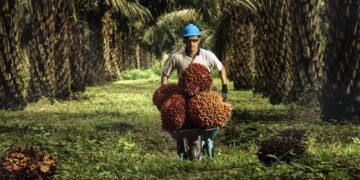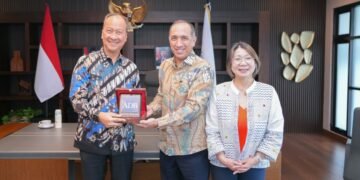Writer: Yang Shifang (Steven Young) – President University Master of Technology Management student
Jurnalindustry.com – Nowadays, when you enter through a mall in Jakarta, you will discover milk tea businesses everywhere, and almost all of them are Mixue. In the last three years, Indonesia’s milk tea business has grown quickly, and young people will sing the Mixue theme song. According to the data, since Mixue’s make their debut in Indonesia in 2021, the milk tea business has grown very quickly. Mixue has over 3,000 locations as of March 2023, quickly capturing key towns in Indonesia while establishing its position as the top milk tea brand there. Momoyo comes in second, with 500 outlets. Wedrink comes third with 400 outlets. Chatime from Taiwan comes fourth, with over 300 outlets.
In China, Mixue is also the earliest milk tea brand with the most outlets. As of 2022, Mixue has 16,227 outlets in the Chinese mainland, followed by Shuyi Tealicious with 6,466 outlets. By the end of 2023, Mixue has more than 36,000 outlets worldwide (including China), becoming the world’s second largest beverage brand, second only to Starbucks. Since 2016, the current milktea market has steadily increased year after year; however, caused by the epidemic, the market size decreased in 2020, and it will return to normal levels in 2021. According to data, China’s milk tea business is expected to be worth 40 billion US dollars in 2021, up 51.96% from the previous year. By 2022, the market is expected to be worth $42.6 billion. After the Chinese market had been saturated, Chinese milk tea firms took advantage of the end of the new coronavirus pandemic and sailed to sea in enormous numbers, quickly dominating the Indonesian market, and introducing Indonesian young people to milk tea. Data from 2023 indicate that Southeast Asian consumers used 3.66 billion US dollars of new tea throughout the year, with Indonesia accounting for 1.6 billion, or 43% of the whole market. In Indonesia’s 280 million population, young people account for up to 70%, and they are the main consumers of milk tea. At the same time, Indonesia’s economic volume is enormous, its GDP is the highest in Southeast Asia, the development momentum is strong, and the milk tea market has plenty of opportunity for expansion.
Milk tea products, a “tea and flavored tea beverage” under the category of freshly prepared beverages, can be defined as a beverage consisting of herbal extracts of the leaves of tea or their infusions and (or) concentrates that are consumed tea powder (including instant tea powder, ground tea powder), either with or without the addition of other milk and (or) dairy products, sugar (table sugar, starch sugar), or syrups. A freshly prepared drinks made with fresh fruits and vegetables or other culinary items.
Mixue as the world’s second largest beverage brand, it has many marketing strategies worth learning from:
1. Marketing Publicity: brand publicity and promotion through various channels, including TV advertising, outdoor advertising, online advertising, event sponsorship, etc. A “你爱我我爱你,蜜雪冰城甜蜜蜜” became the hottest theme song.
2. Product Innovation and Diversity: Mixue will constantly launch new products to attract consumers’ attention and maintain a competitive edge. They will also provide a variety of products to meet the tastes of different consumers, including milk tea, fruit tea, coffee, juice and so on.
3. Online and Offline Sales Channels: In addition to traditional physical outlets, Mixue will also use Internet platforms for sales, including official websites, mobile apps and social media. This can expand brand exposure and facilitate online ordering and delivery services for consumers.
4. Brand Positioning: The brand positioning of Mixue is “to allow everyone in the world to enjoy high-quality and affordable delicious”, which determines that the characteristics of its products and services will be affordable and delicious; “Ice cream and tea” also defines the type and range of products.
5. Industrial Chain Layout: In the layout of the current tea industry chain, Mixue has created a complete industrial chain integrating product research and development, production, warehousing and logistics, sales and chain operation, forming a commercial closed loop that controls cost and quality control in the upstream, inventory and turnover in the middle stream, and scale and standardization in the downstream.



































